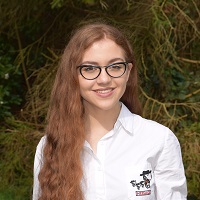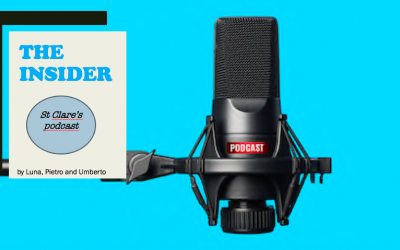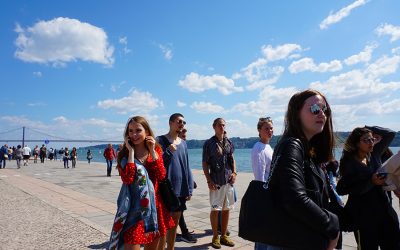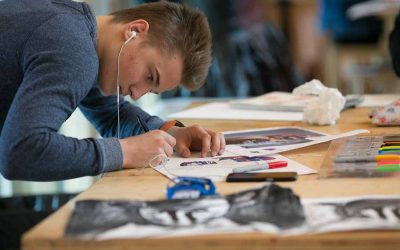The first episode of “The Insider” has just been published. “The Insider” is a new podcast created by our International Baccalaureate students. The podcast series seeks to find out more about teachers and gain unique insights on things they have learned on their...
The International Baccalaureate
• in-depth preparation for university
• make friends from around the world
Key Facts: The IB Diploma
| Age at entry: | 16-18 |
| Start date: | 29 August 2019 |
| Length: | 2 Years |
| Class size: | Average 9 (Maximum 15) |
| Lessons: | Six subjects (three standard level & three higher level) plus core elements |
| Tuition Fees: | From £19,878 |
| Term dates: | Dates and Fees |
The IB Diploma at St Clare’s
St Clare’s is a co-educational sixth form college for day students and boarders in a beautiful area of north Oxford.
‘The quality of the students’ academic achievement is excellent’ –
ISI report 2019
Why choose St Clare’s? We put our success down to a combination of factors:
The atmosphere here is informal and friendly, with an equal emphasis on hard work and encouraging personal responsibility.
- we have been offering the International Baccalaureate Diploma for over 40 years, longer than any other school or college in England
- there are only 13 other institutions in the world that have taught the IB for longer than us
- we offer an especially wide range of subjects at higher and standard level
- unlike other schools in the UK we teach literature in over 25 different languages
- our students regularly win places at Oxford, Cambridge, London School of Economics, Imperial and other leading UK universities, as well as Harvard, Yale and Stanford in the USA
- currently we have students from over 40 countries living and studying here
- we do accept day students provided that their family home is within reasonable travelling distance to St Clare’s
- students who are serious about their work value the supportive environment and excellent teaching
- all students are cared for by our residential staff and personal tutors
- our regulations and boarding practice may not be as strict as those found in many other boarding schools. However, our rules are designed to foster the development of the student’s independence and responsibility in an atmosphere of mutual respect and trust
- students are encouraged to take full advantage of the opportunities that Oxford provides
The college has a worldwide reputation for its expertise in providing the IB Diploma and embraces internationalism and academic excellence as its core values.
As more parents and students are choosing the IB instead of A Levels, it is clear that we can offer a better standard of education for those who want something different.
These links explain in more detail about the IB and why this is the better course to choose for your preparation for university:
Truly international, vibrant, fun, gets the right results, couldn’t do better … if you want to go the IB road – Good Schools Guide
Sara – Albanian

Medicine at University College London
As an international student applying to study medicine, my two years at St Clare’s were basically a balancing act on a very fine line between complete failure and success. Luckily, along the way I had the support of amazing teachers and friends through every step. St Clare’s has made me a stronger person and I can now face the challenges of my future with confidence.
Choosing subjects
Choosing subjects
How do I choose the subjects I want to study?
A number of factors need to be considered before making subject choices. What do I want to study at university? What subjects do I enjoy? What subjects am I good at?
The IB Diploma allows students to choose subjects from six subject groupings. This means that every student chooses one subject from each of the following groups. Three subjects are studied at Higher (H) Level and three at Standard (S) Level for two years.
- The three Higher Level courses should be subjects you enjoy and which support your career aspirations. These are the subjects you will study in depth.
- The three Standard Level courses will provide you with an interesting, balanced programme.
We offer an exceptionally wide choice of IB subjects. You will choose one subject each from groups 1 to 5 and then a sixth subject from either group 6 or another from groups 1 to 4.
Download the IB Diploma Guide – for more detailed information about the subjects
| Group 1 |
|---|
| Studies in Language and Literature First language or native language |
|
This is your first or best language. The following Literature courses are offered:
|
| Group 2 |
| Language Acquisition Second language |
|
This is the language you are learning. Most students choose English as this helps with the study of other subjects. Some of our students are bilingual or trilingual and study another second language.
|
| Group 3 |
| Individuals and Societies |
|
Individual and Societies currently includes:
|
| Group 3 or 4 — Interdisciplinary |
| There is only one course in this group — Environmental Systems and Societies. When making a subject choice, Environmental Systems and Societies can be included in either Group 3 or Group 4. |
| Group 4 |
| Science |
|
| Group 5 |
| Mathematics |
|
Mathematics: Analysis and approaches is intended for students who wish to pursue studies in mathematics at university or subjects that have a large mathematical content; it is for students who enjoy developing mathematical arguments, problem solving and exploring real and abstract applications, with and without technology. Mathematics: Analysis and approaches will be a development from the current Mathematics HL and SL subjects. At HL, the course is intended for students who wish to study Mathematics at university, or subjects with a substantial mathematics content such as engineering or physics. Mathematics: Applications and interpretation is being designed for students who enjoy describing the real world and solving practical problems using mathematics; those who are interested in harnessing the power of technology alongside exploring mathematical models and enjoy the more practical side of mathematics. Mathematics: Applications and interpretation SL will be developed from Mathematical studies SL. The HL course will include new content and elements of the current HL statistics and discrete content At HL, the course is intended for students who wish to study social sciences, psychology, economics, business management, medicine or design at university. |
| Group 6 |
| Arts and Electives |
|
You can choose to study Music, Theatre or the Visual Arts from this group OR you can choose one of the following:
|
The Core Elements
The Core Elements
The IB Diploma contains three core elements that help provide additional academic specialisation and a recognition of interests outside the classroom. These are the Theory of Knowledge course, the Extended Essay and CAS (Creativity, Activity and Service) .
What is Theory of Knowledge?
This a practical philosophy-based course, and is a compulsory element of the IB. This course helps train young minds to question and think in an analytical way, skills essential for success at university.
What is the Extended Essay?
This is an original piece of research relating to one of the subjects being studied, e.g. an Economics student might look at the performance of a company or business. The research is written up into a 4000 word paper. Again this is a skill which is extremely useful in preparing students for the academic challenge of university-level work.
Creativity, Activity, and Service (CAS) is an extracurricular programme and each student is required to be involved in CAS experiences on a regular basis over the two years of the Diploma.
Other useful information
Other useful information
You might like to look at the following detailed information to help you further in making your choice
How to apply
Entry is based on previous academic results and interview. We have a competitive scholarship and bursary programme awarded by examination, interview and group exercises.
We will be happy to send you our IB Diploma Guide, full details on how to apply and an online Application Form. We encourage prospective students to contact us with any questions they may have. You can register your interest in hearing more about the course and the college using this online form.
1. School reports and application form
To begin the application process, please send us the applicant’s school reports from the previous two years by email. We will then send you a link to our online application form, which includes a link to pay the £100 Registration Fee.
2. Visit to the College and interview
When we have received all of the above, we will assess the applicant’s school reports. If these are satisfactory, we will invite the applicant and their parents to visit St Clare’s for a tour and an interview.
For IB Diploma and Pre-IB applicants this will include a Mathematics Placement Test (50 minutes) and an English test (40 minutes). The English test is a comprehension paper that involves analysing text and therefore it will also be taken by applicants who are native English speakers. This is not an entrance examination.
3. Offer of a place
We are normally able to tell the applicant and their parents our final decision on their application at the end of the visit. If the interview is satisfactory we will offer the applicant a place at St Clare’s and this will be confirmed by email in an official offer letter that includes an Acceptance Form.
4. Acceptance of the offer
Parents wishing to accept the offer must complete the Acceptance Form within the deadline given in the offer letter and return by email. When parents accept the offer of a place at St Clare’s they will need to pay an Enrolment Deposit of £2,500.
5. Joining information
Instructions on how to access the joining information are included in the offer letter.
If you have any questions or if you require any further information about the application procedure please contact Chris Osbourn, Admissions Registrar — chris.osbourn@stclares.ac.uk.
Fees
Academic Year 2019 – 2020


Our other courses
- Preparatory-IB course — provides an excellent preparation for the full IB Diploma
- IB Introduction Course — this three week course in the summer provides an excellent preparation for students about to start the IB in September
- IB Teacher Workshops — for both new and experienced teachers in co-operation with the International Baccalaureate Organisation IBO
We would be happy to show you around the college
You will be able to talk to staff and students and find out more about living and studying here
A student view: Our CAS experience in Lisbon
On 21 March 2019 we were lucky enough to go on a study visit to sunny Lisbon as part of our Creativity, Activity, Service (CAS) experience. We decided to film our adventures in Lisbon, to tell the story from our perspective. Firstly, a bit of background....
Are you trying to decide between A-levels or IB?
St Clare's was founded in 1953 as a college which specialised in A-level. As St Clare's focused on advancing international education, in 1977 St Clare’s decided to stop teaching A Levels in favour of the then little known International Baccalaureate Diploma. We...




